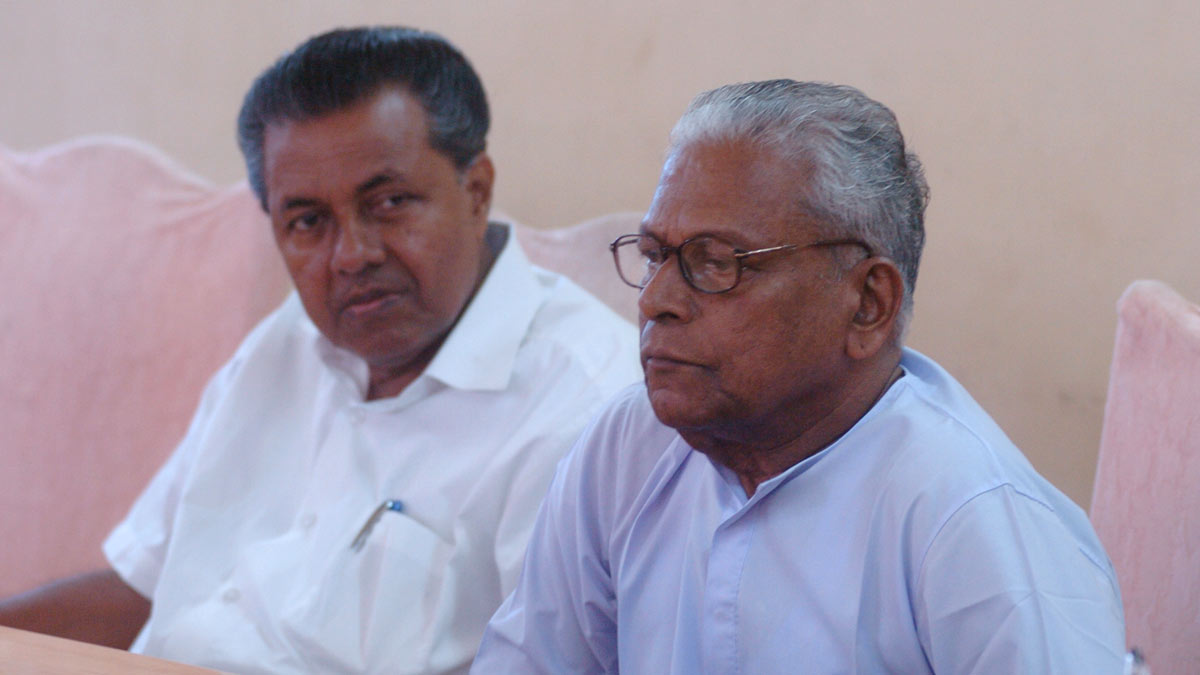V.S. Achuthanandan and Pinarayi Vijayan: Two sides of the proverbial coin?
 (File) V.S. Achuthanandan and Pinarayi Vijayan | Robert Vinod
(File) V.S. Achuthanandan and Pinarayi Vijayan | Robert Vinod
V.S. Achuthanandan had many political rivals during his long career, thanks to his sharp tongue and unrelenting stance on issues close to his heart. One such epic and enduring rivalry was, ironically, with his own party comrade and current Kerala Chief Minister, Pinarayi Vijayan.
Their decades-long feud—rooted in ideological differences, personal animosity, and power struggles—has significantly shaped the political landscape of Kerala and exposed the deep factionalism within the CPI(M).
As an old-school Marxist, VS represented the purist Left, staunchly anti-corporate section within the CPI(M). His rigid stance earned him the moniker vikasana virodhi (anti-development). Vijayan, in contrast, embodied pragmatism. He was open to engaging even with neo-liberal policies and corporate-friendly approaches, creating a fundamental ideological rift between the two.
ALSO READ: How Punnapra-Vayalar uprising made V.S. Achuthanandan a staunch Communist
Interestingly, Vijayan was once seen as a close associate of VS. But the relationship soured in the late 1990s as Pinarayi started consolidating power within the party. In 1998, Pinarayi succeeded Chadayan Govindan as CPI(M)’s Kerala state secretary, a position he held until 2015. This period witnessed extreme factionalism within the party, with VS and Vijayan leading opposing camps. While Vijayan, backed by the state leadership, aimed to quash factional tendencies, VS emerged as the face of internal dissent, relying on mass public support and ideological rigidness.
According to VS’s biographer P. Jayanath, there were two key moments when party leaders feared VS might leave the CPI(M). The first was after the 2005 Malappuram state conference, where the VS faction was decisively sidelined. The second came in 2015, following his dramatic walkout from the Alappuzha state conference. Both instances stemmed from power struggles with the Vijayan camp.
ALSO READ: V.S. and the 'Vettinirathal' saga: How Achuthanandan singled-handedly decimated CITU lobby in CPIM's 1998 Palakkad conference
At the 2005 Malappuram conference, all candidates proposed by VS for the state committee were defeated. The state committee, dominated by Vijayan’s faction, re-elected him as state secretary. Later that year, VS was also removed as editor of the party mouthpiece Desabhimani, further diminishing his clout. While Vijayan’s grip over the party organisation strengthened, VS’s public image as a wronged communist only grew stronger.
In 2007, the intra-party feud reached a new low. Both VS and Vijayan were suspended from the Politburo for publicly criticising each other, a violation of party discipline. Though the suspensions were temporary, they made the rift starkly visible. In 2009, VS was demoted again for his public stance on the SNC-Lavalin corruption case—allegations related to a 1996 deal signed by Vijayan as power minister.
VS subtly questioned the party's silence in the matter. His stance angered the leadership and intensified internal tensions.
ALSO READ: Kerala's Fidel Castro visited home turf Alappuzha every Onam, heard out neighbours at Velikkakath house
In 2011, Vijayan’s faction tried to deny VS—then 87 years old—a ticket for the assembly elections, citing age and health. But intense public backlash forced the Politburo to reverse the decision. VS contested from Malampuzha, and won, and became the chief minister.
The murder of T.P. Chandrasekharan, a former CPI(M) leader who founded the Revolutionary Marxist Party (RMP), in 2012 added fuel to the fire. While Vijayan branded Chandrasekharan a “traitor,” VS paid homage to the slain leader, further highlighting the divide.
At the 2015 state conference in Alappuzha, VS walked out in protest after the annual report, prepared by Vijayan’s faction, criticising his “anti-party activities.” A resolution was passed labeling VS a “factionalist”. Yet, his immense popularity protected him from expulsion.
After the 2016 assembly elections, the CPI(M) chose Vijayan to lead the LDF government, sidelining VS. To mitigate public resentment, VS was appointed chairman of the Administrative Reforms Commission with cabinet rank—an apparent consolation prize. VS, however, expressed disappointment. This phase marked the end of the open VS-Pinarayi Vijayan feud, with the latter cementing his control over both the party and the government.
Vijayan chose to downplay the rivalry in the years post the elections. He also paid a rich tribute to the veteran Communist leader on X.
India